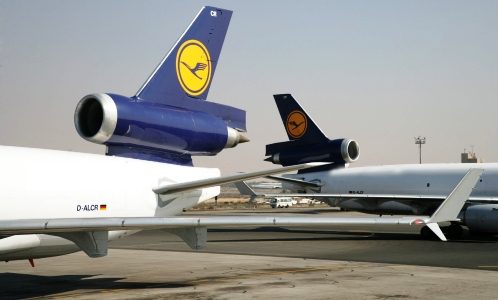Lufthansa Cargo has hit out at the temporary ban on night flights at Frankfurt Airport that will be introduced from October 30. This surprising late notice decision will see the airport closed from 23:00 to 05:00 hours and will have a considerable negative consequence on the operations of the airline and wider logistics sector, according to the carrier.
Following the ruling from the administrative court in Hesse, the airline’s chairman, Karl Ulrich Garnadt, has underlined the need for individual cargo flights at night-time, especially as the company had been guaranteed an average of ten flights per night from the German airport.
“Closing the world’s seventh biggest airport for six hours each night and thereby decoupling it from the international goods flows constitutes a severe blow to the air traffic industry. No other transport mode is subject to such operational restrictions,” said Garnadt.
To get around the closure, Lufthansa Cargo has had to modify its winter schedule at what it describes as “great expense” to keep its operations comparatively intact. A number of flights have had to be allocated daytime slots in the evening or morning, while many others have been cancelled. Some services to China now have to stop over at Cologne/Bonn for several hours after an earlier evening departure from Frankfurt.

“The night-flight ban has forced us to lay on a timetable, which in part is economically and ecologically absurd,” explained Garnadt. “We will be operating in future with unnecessary take-offs and landings, which will lead to more noise, higher fuel consumption and more costs running into millions.”
Furthermore, from January 2012 one of the airline’s McDonnell Douglas MD-11s will be transferred from Frankfurt to Cologne/Boon to provide indispensable overnight flights for the German logistics industry to North America, which the carrier says can no longer be guaranteed from Frankfurt because of the night-flight ban.
Karl Ulrich Garnadt believes the new rule ultimately threatens to sever Germany from global trade lanes. “As export world champion, Germany is reliant on dependable connections to ship airfreight to destinations around the globe. Frankfurt Airport plays in that respect a highly important role, since around 40 per cent of German exports is transported by air,” he noted.
The airline and other freight operators are now waiting on the Federal Administrative Court in Leipzig (the supreme court of appeal) and whether an appeal will at least allow a small number of night flights in its final ruling.
“In the coalition agreement, the Federal Government had highlighted the importance of competitive operating times at German airports. I firmly assume that the Leipzig court will reach a commensurate balance between the economic necessities of the exporting nation Germany and the interests of local residents,” said Garnadt. “German airlines have in recent years succeeded in steadily reducing noise emissions. That achievement should be recognised in any decision on the issue of operating times at German airports.”





